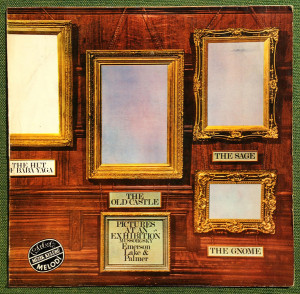
Published on Jun 15, 1999
There are certain albums that no self-respecting music fan
should like, according to the mainstream music establishment.
Pictures At An Exhibition is one of these. Further, there
are certain progressive albums that no self-respecting prog fan
should enjoy.
Pictures At An Exhibition is, it seems, also one of these.
The low-culture “populists” can’t deal with classical music in
their visceral three-chord “rawk” while the high-culture twits
can’t deal with the “mutilation” of Mussorgsky’s piece (and God
help us that ELP should actually dare to write more music and –
GASP! – add lyrics to some of the extant movements). I guess my
iconoclastic martyrdom will be complete when I utter the following
dangerous phrase: I FREEKING LOVE THIS ALBUM!
Pictures At An Exhibition is a live recording of prog
supergroup Emerson, Lake, and Palmer’s 35-minute electric treatment
of Mussorgsky’s classic suite (you’ve probably heard the famous
orchestration by Maurice Ravel) from 1970, the group’s first major
tour. It has been the subject of constant revulsion since its
release from rock critics (who consistently pick it one of the
worst albums of all time) and fans of “serious” rock music who
usually consider it an embarassment.
I think this is more a phenomenon of “follow the leader” than
anything, because
Pictures is one of the most uniquely conceived and performed
rock pieces in the history of the genre, and one of its most
adventurous. Perhaps the notoriously anti-ELP critics saw it as a
chance to take the pentultimate shot at their foes, but whatever
the reasons behind it, this is a helluva performance by three
musicians in their prime who simply loved to play fast, loud, and
complex.
ELP is often accused of being pretentious and pompous–trying to
somehow elevate their ‘common’ genre by bringing in the tunes and
forms of a “higher”, “more intelligent” brand of musical
expression. However, my experience of ELP has been that they are
among the most joyful, fun, and least serious progressive bands –
the “pomp” is often done for ELP’s own amusement (the song “Living
Sin” in particular seems to be the trio making fun of their own
occasionally ponderous style) and Emerson’s critically reviled
“desecrations” of the classics are always done with a sense of
humor and used as a showcase for the group’s virtuosity.
Pictures also is unique because it is a living document of
the band’s exciting first phase when they sounded more like the
Nice with a decent vocalist and a speedfreak drummer than a
prog-rock dinosaur. At the Isle of Wight Festival in 1970, the
group’s momentous performance of
Pictures (topped off by Keith setting off a cannon at the
piece’s climax) blasted them into national prominence.
Beginning with the familiar “Promenade” theme played at a
stately pace by Emerson on organ, Pictures stays close to the sound
of Mussorgsky’s original for the first couple pieces – “The Gnome”
follows closely the orchestral version, although Emerson’s Moog and
Hammond give it much more bite and the Lake/Palmer rhythm section
provide a plodding, bluesy beat. The second incidence of the
“Promenade” section is a pretty vocal/organ duet between Lake and
Emerson (the first example of the group adding lyrics to the piece)
and fades into “The Sage”, a sublime Lake acoustic ballad, with
unbelieveable choirboy vocals over neat Spanish-sounding
flourishes.
This is where ELP begins to take Mussorgsky and rock and throw
them in a blender, fire it up to “puree”, add a Moog and some fat
Hammond sounds, and see what happens. What happens is “The Old
Castle/Blues Variations”, a considerably louder version of the
original that features some of ELP’s best jamming. The group really
seems to swing here, with Emerson’s jazzy soloing (taken in part
from the Nice’s version of Bob Dylan’s “My Back Pages”) taking
center stage.
This ends the first side of the album. The second side offers
the last 12 minutes of the
Pictures suite, and must be considered among their most
intense bits of music ever. Starting with a slow, stately full-band
return to the “Promenade”, it leads into an intense “Curse Of Baba
Yaga”, with Palmer pushing the group faster and faster into the
lightning-fast main theme, with Hammond abuse galore. “The Hut Of
Baba Yaga” features a quick bass solo from Lake, some weird
space-noises from the Moog, and then into a blistering main theme,
with intense vocals from Lake punctuated by blasts of Hammond.
A return to the “Curse” theme builds the tension further before
it explodes into the lengthy, dramatic “Great Gates Of Kiev.” This
is the one place in which ELP fails to match the Ravel
orchestration’s dignified pace. ELP’s is taken too fast, and
Emerson’s organ freak-out during the middle (just what in the hell
is he
doing with that thing, anyway?) is kind of inappropriate
(although some would say the entire thing qualifies for that).
Oh, and it ends with “Nutrocker”, which is just unspeakable.
Whether you think the idea behind the album is stupid,
groundbreaking, or insulting, and whether you think the performance
is awe-inspiring, wankery, or just plain silly, I challenge you to
give this one more listen and just erase all the negative reviews
and attitudes from your mind. What I hear is three tremendous
musicians laying it all on the line, having a great time, and
definitely enjoying themselves.
Yeah, I love this album. So sue me.